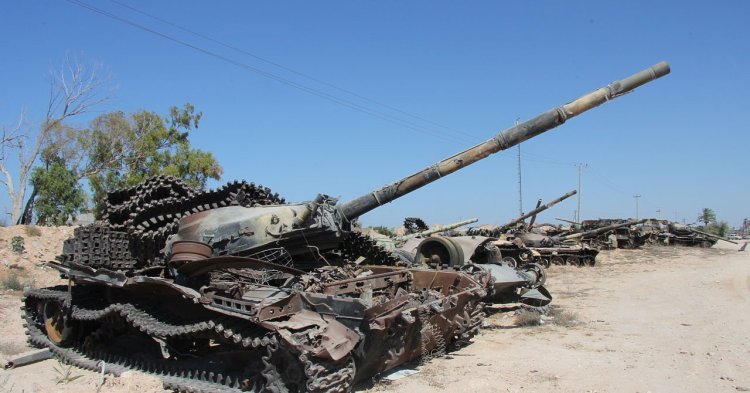“We will not blame the youth, but when they are caught and prosecuted they will be begging for mercy but this time we will not be so merciful. [1] Muammar al-Quaddafi’s remarks from February 22, 2011 show the gravity of the situation in Libya.
An intervention is inevitable
In the light of this call for violence an intervention of the international community under the auspices of the EU and NATIO is inevitable. Otherwise the Libyan people could be victims of large-scale violence and as a last consequence could find themselves in the midst of a civil war. Objections, like a western-led intervention would delegitimize the Libyan uprising or the military capacities of the EU/NATO were exhausted, dare not play a role given the unique structures in Libya. Since, Libya, however, differs in several important ways from Tunisia and Egypt.
The military’s role in Libya
First and foremost, there is less high-ranking military personnel and in contrast to Egypt the upper ranks are much more under the influence of Quaddafi [2]. What is more, Quaddafi could rely on personal elite troops, which are commanded by his son Khamis Quaddafi. In addition to this the armed forces itself are very fractionalized along tribal lines. In other words the respective tribe is more important than the military esprit de corps [3]. This is of utmost importance for a possible post-Quaddafi era because the armed forces, due to internal rivalry, could not step in as power broker for a transition period. By the same token, it is more likely that latent power struggles within the upper ranks will become open contested fights that could bring Libya on the brink of a civil war.
Quaddafi and tribal politics
Power- sharing and, on the flipside, restricting the influence of Libyan tribes is key to the understanding of Quaddafi’s mode of governance. Central actors of the regime are recruited out of his own tribe Qathathfa. Other tribes are co-opted through semi-influential offices and the so-called basic people’s congresses. In sum this could lead to a dangerous dynamic because first actors and tribes are leaving the tight-knit power- sharing regime [4]. Seeing his skilful planned network falling apart Quaddafi tries to hamper this development with instigating his partners-in-crime to further violent acts as the above quotation from his remarks prove. As a result a violent clash of the separate groups could evolve.
Obstacles for a transition of power
There are several obstacles for a smooth transition if Qaddafi, despite contrary remarks, steps down or flees from Libya. First of all, political parties or similar political associations are non-existent in Libya, due to constitutional restrictions and direct democratic elements. Furthermore, the civil society is underdeveloped and in particular the media landscape. Thus, it is very difficult to get reliable information from Libya. Quaddafi’s sons, particularly the at least partly pro-western oriented Saif al-Islam, are with respect to their recent remarks also not suitable for a succession [5]. In a nutshell the large-scale violence, the lack of the armed force’s autonomy, the rivalling tribes as well as the non-existent civil society and political parties make an international intervention inevitable. But on which common ground could the intervention be based on?
Responsibility to Protect (R2P) and the EU Battle groups
On the World Summit 2005 almost all countries adopted the so-called Responsibility to Protect (R2P) doctrine [6]. This doctrine puts the protection of human lives against human rights violations in the centre and envisages three steps [7]:
1.Responsibility to Prevent
2.Responsibility to React
3.Responsibility to Rebuild
The first step, containment and prevention of violence, obviously failed. Therefore especially the second step, the reaction to “large-scale loss of human lives”, is decisive. The death toll exceeds meanwhile 500 persons and Quaddafi’s willingness to “die as a martyr” shows clearly that it is the fierce urgency of now, which makes immediate action inevitable to prevent further dead persons. In a last step – and this one is due to the structural problems, laid down above, impossible to carry out without foreign assistance – civil society and statehood must be re-established. In accordance with public international law a mandate issued by the United Nations Security Council is necessary for an intervention. Yesterday (February 22 2011) the Security Council discussed the recent developments in Libya behind closed doors and condemned the violence in a subsequent press release [8]. European Union Battle groups [9] and the NATO Response force [10] could lead the intervention itself. Both quick reaction forces can be deployed within a few days. The protection of the civilian population must be the foremost priority accompanied by measurements such as the enforcement of a no-fly zone over Libya, the establishment of corridors for humanitarian aid and last but not least providing border security to prevent the further invasion of pro-Quaddafi militias from neighbouring countries.
The calculus of the EU
As a matter of course the protection of human lives and compliance with human rights are the foremost priority. But beside this there a few problems which could accrue if the EU does not consider an intervention. First of all, this could lead to another humanitarian crisis namely to tens of thousands of refugees who want to flee their crisis-ridden country. This huge flow of refugees would mainly affect the Southern EU member states Italy and Malta. If the situation in Libya becomes worse more and more Libyans will cross the Mediterranean Sea to Europe.


1. On 25 February 2011 at 11:47, by Frank Stadelmaier Replying to: Libya – a plea for an international intervention
Replying to: Libya – a plea for an international intervention
I cannot but warn in the most urgent manner about taking an interventionist position on Libya, as this article proposes.
Besides the fact that any intervention of ground troops is of high military risk (for the soldiers and for the population), the political costs in this case can be enormous. We Europeans should do anything but take a paternalising “typically Western” stance of interference with an ongoing revolt which we salute, but which is not ours, and to which we (as EU) have contributed nothing, quite on the contrary.
In the case that the revolt should not be successful in the short term and a civil war breaks out, we as Europeans and Westerners should offer our help to the Arab League and the African Union to settle the conflict, including military measures as a last resort, under the mandate of the Security Council if possible. But we are not yet there, fortunately, and we should beware not to play the part of typically “Western”, i.e. “benign” interventionists.
First and foremost we have to respect the autonomy of the local people and their wider (Arab, African) community. Only in response to local demands and with legitimising bodies like the Arab League and the African Union can we claim to credibly defend universal values (human rights).
A unilateral EU/Western intervention at this point of time would highly risk to disrupt the autonomous revolutionary process of deposing al-Gaddafi in view of establishing the bases for a more democratic, autonomous (!) Libya, and Arab world. We should not compromise ourselves even more in this region, forgetting Europe’s colonial history and wanting to carry “the white man’s burden”.
2. On 25 February 2011 at 22:42, by Nico Replying to: Libya – a plea for an international intervention
Replying to: Libya – a plea for an international intervention
Marian, I wholeheartedly agree with your reference to the Responsibility to Protect doctrine, as this concept has gained more common acceptance throughout liberal-minded democratic states. However, Quaddafi claims from his end that a conspiracy is going, grasping to terms as martyrdom etc. So he’s quite a mass manipulator and/or a delusional madman (likely both).
As foreign press is excluded or spindoctored (like CNN), there is a need as well for a certain degree of free speech to Libyan citizens at this time. To really open the channels up to the international world. And to fuel especially a message of hope and vocal support, that they should not fear, that the international community shall not remain indifferent to a genocidal leader - whose acts should be held accountable if the people let go of fear. A strong message would be: the loyalist military commanders who side with Quaddafi still cannot hide behind the consequences of indiscriminate murder, and would not be able to receive any rewards for their loyalty as Quaddafi’s offshore billions will be frozen indefinately in foreign banks. As such, the pay-off of inclining is illusory.
By the way, even before any Battlegroup or NRF forces would hit the shores of Tripoli, consider the need for international observers (UN?) to properly account and document the instances of genocide - so if it comes to a capture of Quaddafi there would be an uncontestable body of evidence to hold against him. The spurious clips of killings are one thing, but there could be legal trifling about the actual bullet rounds which used the deaths of civilians... fairly tough call if the evidence is fragmentary or hypothetically deferred to ’opposing’ hostile civil factions looting etc. So the body of evidence should be kept intact from the outset.
The same regarding the allegations that Quaddafi is using contracted mercenaries (private military firms) to dispose of the rioting insurgents. There are many legal gaps prohibiting the clear establishment of a link between them and Quaddafi - if they flee the country without leaving ’hard’ traces or names to identify them, there is only rumour and little paper that says: Quaddafi paid these men and there’s signed contracts proving he ordered the mercenary snipers and foot soldiers to decimate the opponents. It’s not just Quaddafi who should be held responsible but also these private military... if they don’t just disappear at the time an armed intervention is authorized.
By the way, the NATO Secretary General has in fact stated NATO would not deploy armed forces in Libya. The evacuation of citizens belonging to NATO member states waters down the argument to pursue a NATO ’hard action’ at this time. ’Limit the consequences’ is a prime concern for NATO, along with evacuation and humanitarian assistance, and be an ’enabler and coordinator’ for NATO member states if they require so in the context of evacuation. There’s also a big chance that Russia and China will obstruct the intervention plan if it comes to that in the UN Security Council.
Follow the comments: |
|
